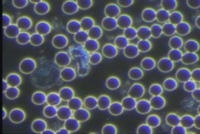What You Need to Know About Viruses
Billions of people worldwide are following the news daily for new cases of pandemics. We are observing various measures taken globally, from closing of countries’ borders to sanitizing offices at night. It has become an obsession, a source of panic in society and stress in families, especially with members suffering with compromised immunity. People look for answers to how protect themselves and their loved ones against the unexpected disease.
In our Prevention Section we’ll talk in detail on How to Boost Our Immune System in the times of pandemic.
First of all, we will describe what viruses are, how they spread and how they attack our body. Then we will aim to understand why some people get them and others don’t. Then, most importantly, we will learn what we can do to minimize our chances of contracting the disease and enduring its side effects.
What Are Viruses?
There are multiple theories on how viruses appear. Some believe that viruses are genetic elements of cells that are no longer living, which gained the ability to move between cells. The most logical explanation of the viruses’ origin I’ve heard was: bacteria + chemicals = virus. While not being proven scientifically, it makes perfect sense to me. Bacteria and virus provoke same immune system reactions in the body and function similarly, by the exception that virus is more sophisticated and may multiply from a smallest fragment. Whatever viruses are, viruses develop and adapt to the environment super quickly, before our immune system starts realizing that they are there.
…We need to understand what viruses are, how they spread and how they attack our body. Then we need to understand why some people get them and others don’t.
Strong chemicals and other adverse factors may force viruses to fight for their survival, their strongest species/particles survive, mutate and create new, stronger strands. From this perspective, we can never win the battle with a virus by any strong drugs or chemicals. If one survives, what does not kill it, makes it stronger. Frequent sterilization with high strength chemicals and antibiotics, while initially effective, may contribute to mutation of viruses into more virulent ones – against which those chemicals may soon become less effective and eventually powerless – and the battle continues.
Viruses are living organisms (though this is still debatable scientifically, I use this term for practical reasons – viruses do act as living organisms, although parasitic ones). All living organisms live on a basic principle of survival. They live off their host, getting all nutrients from it and disposing all their toxins within it. Viruses aim to multiply fast, taking over space from other cells and replacing them. Viruses basically will try to annihilate them, causing a cellular explosion. Often they attach themselves to the lungs or liver cell receptors, but it may be any other cell as well.
What Do Viruses Use to Attack?
There are 6 important things you need to know about viruses:
-
-
- Viruses are scavengers: they live only on the dead matter and toxins. There should be cellular dysfunction, dead tissue and chemicals present, in order for virus to live. Luis Pasteur (after whom pasteurization process is called) admitted on his death bed, that he could not grow germs on healthy apples, but only on the rotting soup. He admitted that the soil, not the germ is what predetermines the fermentation process!
- Viruses cannot live in oxygen rich environments. Oxygen causes inhibition of virus’s metabolism and respiration (=breathing). Viruses cannot multiple and take over in oxygen-rich conditions.
- Body needs to be malnourished, for the virus to take hold. Proper nutrition helps our body to produce hormones, enzymes and other substances that are important building blocks of our immune system and other cells. Lack of sleep and other factors essential for our well-being lower our immune system.
- Antibiotics cannot do anything with viruses. There is no known cure.
Even worse – the viruses should not be attacked, because they will get worse. They will hide in tissues and remain dormant, but with right conditions, will start rapidly multiplying and come out again. Even if the new vaccine, which takes 8-12 months to develop, proves to be effective short-term, this does not guarantee it will work on the new species of the same virus next year, due to its mutation. A virus may re-multiply itself from the smallest fragment of its cell. In the process, it learns how to adapt and changes to become even stronger. This is the reason why influenza, killing 250-500 million people annually, still has not been eradicated, despite of the ongoing vaccine development. - The only and THE ONLY reliable protection from viruses is your immune system.
For example, macrophages (type of immune cells) work totally differently. They do not attack. They engulf the virus and suffocate it, depriving of food and air. Viruses cannot live on their own and depend on their environment for these. - Healthy Body Cells = Death to Viruses.
They will not share their food supplies with viruses and will let everyone around know that the thief arrived – be on the lookout!
-
Viruses cannot multiple and take over in oxygen-rich conditions.
How Does Immune System Fight Viruses?
Our body has several systems that will turn on to counteract and eliminate the invader:
- Skin: if healthy and contains significant amount of fat, it will not let the virus through
- Liver: if strong, will produce diarrhea to eliminate
- Lungs: will aim to filter out as much as they can
- Lymphatic and Circulatory Systems: will assist in elimination
- Immune System: this system will declare a war. It will increase metabolism and induce fever to eliminate. It will produce rashes and blisters. Some types of white blood cells will try to bind, swallow, disintegrate – and then eliminate. Basically, your body will be pushing on the gas pedal all the way, burning the accelerator. It will be shoveling and moving things out to the best of its ability.
Strength of each of those systems will largely predetermine ability of our body to overcome the virus.
What Impact Do Toxins Have on Virus Multiplication
- First of all, toxins will prohibit our body cells from using oxygen (cells won’t be able to breathe).
- Secondly, toxins will prevent the cells from production of energy (cells will become weak).
- Thirdly, toxins may do additional damage to the organs in the process when the immune system will try to eliminate a virus, potentially adding to the damage that the virus did itself.
We need to consider that reactivity of many chemicals increases at high temperatures, and in case of a high fever the body temperature will significantly increase. The “heated” toxins eliminated at a high speed, may start burning various organs/ systems.
Understanding the nature of what we are dealing with, what viruses are, how they multiply, and where they can survive and where they can not, can only help us understand how to protect ourselves. COVID-19 certainly is not the first virus scare, and it certainly won’t be the last. They are a part of the world we live in and the more we know, the more we can arm ourselves for the future.
References:
[i] https://www.nature.com/scitable/topicpage/the-origins-of-viruses-14398218/
[ii] https://www.eduplace.com/science/hmsc/6/a/cricket/cktcontent_6a22.shtml
[iii] http://www.superlife.com/pasteur-bechamp-germ-theory/
[iv] http://scienceline.ucsb.edu/getkey.php?key=501
[v] https://www.ncbi.nlm.nih.gov/pmc/articles/PMC4279996/
[vi] https://academic.oup.com/jn/article/136/5/1141/4669934
[vii] https://www.betterhealth.vic.gov.au/health/ConditionsAndTreatments/immune-system
[viii] https://emergency.cdc.gov/agent/sodiumazide/tsd.asp
[ix] https://study.com/academy/lesson/factors-that-affect-cellular-respiration.html
About the Author: Ania Kastashchuk
 Ania Kastashchuk is the Program Manager, Senior Program Director and Co-Founder of Fresh Start Health Retreat, specializing in health restoration using natural health methods. Fresh Start is located on Vancouver Island, BC, Canada. The retreat focuses on 4 areas: Detox & Recharge, Physical Health, Emotional Wellness and Habits Re-patterning (quit smoking, mild social drinking, emotional eating). Over the last 15 years Ania with her husband Vasili and team of professionals have been assisting those who are ready for a change to transform their health and lifestyle naturally.
Ania Kastashchuk is the Program Manager, Senior Program Director and Co-Founder of Fresh Start Health Retreat, specializing in health restoration using natural health methods. Fresh Start is located on Vancouver Island, BC, Canada. The retreat focuses on 4 areas: Detox & Recharge, Physical Health, Emotional Wellness and Habits Re-patterning (quit smoking, mild social drinking, emotional eating). Over the last 15 years Ania with her husband Vasili and team of professionals have been assisting those who are ready for a change to transform their health and lifestyle naturally.





